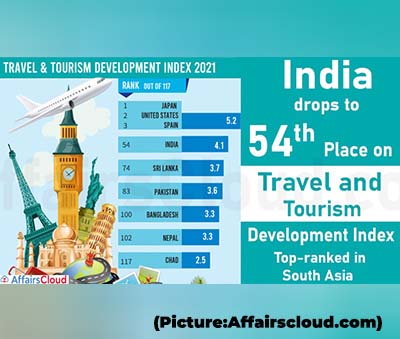After two years of slowdown caused by the Covid-19 pandemic, India’s travel and tourism sector has shown “signs of recovery” and is the top performer in South Asia, according to the World Economic Forum’s (WEF) latest study.
India grabbed the 54th spot in the overall rankings, down from 46th in 2019. The travel and tourism development index assessed a total of 117 countries for the study.
According to a new World Economic Forum research, India’s travel and tourism industry are showing “marks of recovery” after a two-year downturn caused by the pandemic.
According to the World Economic Forum’s (WEF) newest assessment, India’s travel and tourism sector has exhibited “marks of recovery” after a two-year downturn caused by the Covid-19 outbreak.
India fell from its previous position of 46th in 2019 to the 54th spot on the global travel and tourism development index in 2020. Although it has maintained its position as the leading nation in the South Asia region.
 Titled ‘Travel & Tourism Development Index 2021: Rebuilding for a Sustainable and Resilient Future’, the study measured “the set of factors and policies that enable the sustainable and resilient development of the T&T sector, which in turn contributes to the development of a country”.
Titled ‘Travel & Tourism Development Index 2021: Rebuilding for a Sustainable and Resilient Future’, the study measured “the set of factors and policies that enable the sustainable and resilient development of the T&T sector, which in turn contributes to the development of a country”.
In this year’s index — which consists of five subindexes, 17 pillars and 112 individual indicators — Japan took the number one spot, followed by the US, Spain, France and Germany among the top five.
“Covid shutdowns have re-emphasised the important contribution travel and tourism makes to many economies around the world,” said Lauren Uppink, head of aviation, travel and tourism at the WEF, in a statement.
The WEF’s findings credited recovery in tourism due to an increase in vaccination rates, curbs in travel restrictions and economic growth. But noted that the recovery still remains “slow and fragile” due to uneven “vaccine distribution, capacity constraints, labour shortages, supply chain disruptions and more”.
“Government, business and civil society leaders can address barriers to recovery by looking at the different factors that can support the long-term development and resiliency of their respective travel and tourism economies,” added Uppink.
“This will require decision-makers to restore consumer confidence and international openness by prioritizing such things as enhanced health and security measures, encouraging inclusive labour practices, improving environmental sustainability and investing in digital technology.”
The study further revealed that while international tourist arrivals globally have increased by 18 million in January this year as compared to the same period in 2021, they were still 67 per cent below 2019 levels.
